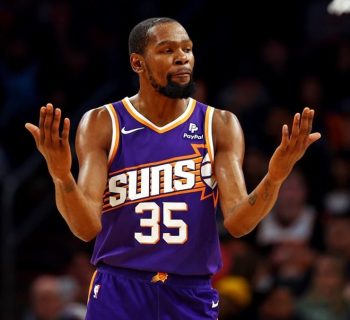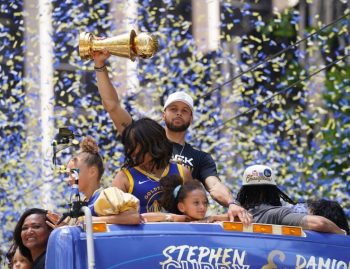NBA
NBA Sunday: It’s Not Championship or Bust

A passionate and heated discussion ended with both sides agreeing to disagree. One defended the decision, while the other characterized it as cowardly.
It’s the morning of July 9, 2010, and just a few hours earlier, the star of stars had put on a spectacle that he will never live down. My siblings and I spent the day conversing about LeBron James, his spurning of and alienating of several fan bases, and whether the damage that he had done to his legacy was reversible or not.
Back then, almost seven years ago, James began what I have since referred to as the “modern NBA’s talent arms race.” Sure, the Boston Celtics had been the originators, but Kevin McHale and Danny Ainge were the ones who ultimately had to pull the trigger to make the union of Kevin Garnett with Paul Pierce and Ray Allen complete.
With James, it was different. And since his decision, everything else has been, too.
What we were taught by Allen Iverson, Tracy McGrady, Steve Nash and a bunch of their predecessors is that all that counts is the championship ring. And in the NBA, P.D.E. (Post-Decision Era), we are witnessing a paradigm-shifting mentality being adapted by the league’s superstars. It’s what led Jason Kidd back to Dallas, Ray Allen to Miami, Dwight Howard to Los Angeles (and then Houston) and Kevin Durant to Oakland.
Indeed, it was their pursuit of the almighty ring that led the aforementioned stars away from the cities where they had made their homes and from fans that had adored them.
The chase for the ring is all that’s important… Or is it?
* * * * * *
On July 7, 2016, after Kevin Durant had signed with the Golden State Warriors, the tweets, phone calls and text messages poured in. Many claimed that the NBA had been ruined. The Warriors would have no competition and they would undoubtedly meet up with the Cleveland Cavaliers to give NBA fans the first trilogy in NBA Finals history.
While some of that may eventually prove to be true, the notion that the regular season isn’t important and that one shouldn’t bother watching because the ending of the story is already known—it all flies in the face of what professional sports is truly supposed to be about.
Competition.
Today, a generation of sports fans are coming of age. They are the same ones that have been sold on the idea of Charles Barkley and Patrick Ewing somehow being lesser players than Karl Malone and David Robinson, primarily because of their inability to lift their franchises up to the top of the NBA mountain. Years later, history doesn’t remember that it was Ewing that led the Knicks up from the doldrums or that Barkley, who played his entire career being undersized, brought the Phoenix Suns within two wins of the 1993 NBA Championship.
So, at the end of the day, those that ignore what is transpiring in Toronto, Boston, Salt Lake City or Washington, D.C. have lost sight of an all-too-important fact: there should be an immense amount of pride and joy in putting up a fight. It would be quite easy for a general manager to shrug his shoulders, fire-sell his assets and pull the plug on his roster when he encounters a dominant force such as Michael Jordan, Shaquille O’Neal or LeBron James.
Instead, Danny Ainge, Masai Ujiri and Ernie Grunfeld have opted to fight. That absolutely counts for something, even if many of today’s fans can’t see that.
Make no mistake about it: NBA fans in Boston, Toronto and D.C. probably don’t think that their respective teams are better than the Cleveland Cavaliers, but any of them would take the opportunity to topple the mighty James in the Eastern Conference Finals, if given the choice.
It took Kobe Bryant almost his entire career to come to peace with an obvious truth: the joy doesn’t lay entirely in the intended destination. To a large extent, the joy is in the process of trying to become a champion. Seeing a team draft and raise players and go from a cellar-dweller to one with poise and polish—there is no greater reward in all of sports. Just go ask someone who has been watching the Utah Jazz.
Seeing that type of team compete over the years and battle ferociously with teams that are more talented and even better—there’s something quite admirable about the pursuit. That’s the reason why Ewing will never have to wait for a table in New York City. He absolutely avoids his fair share of checks, as well.
So next time someone tries to rain on your parade for taking joy in your team’s progression from an afterthought to one that has an opportunity to compete at the highest level, ask them whether they think that DeMar DeRozan or Kevin Love, to this point, has gotten more meaning out of their career. DeRozan was drafted by the Raptors in 2009 and has spent his entire career wearing the same jersey. He has squeezed every once of potential out of his being and, slowly but surely, has become one of the top shooting guards in the entire league. He has seen Chris Bosh, Andrea Bargnani and Jay Triano come and go, and he has seen the franchise slowly reinvent itself and become a contender.
In Boston, Isaiah Thomas has truly become a franchise player, and that’s nothing short of amazing. After being selected with the 60th overall pick in the 2011 draft by the Sacramento Kings, Thomas would last three years there before being traded to the Phoenix Suns for Alex Oriakhi. Oriakhi would never even appear in a regular season NBA game. After being undervalued and traded away from two teams, Thomas, despite being undersized, has become a mammoth in Boston. No, the Celtics may not have Kevin Durant, LeBron James or Kawhi Leonard, but they have something much more valuable: a core that has organically and improbably come together under the leadership of head coach Brad Stevens. They have a front office that has decided to go for it and compete, and they just so happen to enter play Sunday trailing the mighty Cavaliers for the top seed in the Eastern Conference by a half-game.
That counts for something.
That counts for something in the same exact way that Gordon Hayward’s coming of age does to fans of the Utah Jazz. As a rookie, Hayward had a front row seat to the friction between Jerry Sloan and Deron Williams. He was buried on the team’s bench, seeing less playing time than Williams, Raja Bell, C.J. Miles and Earl Watson. He’s seen Sloan and Tyrone Corbin walk through the door, but has also seen the likes of Alec Burks, Rudy Gobert and Rodney Hood arrive. He has sat at the forefront of the franchise’s changing of the guard and has been a part of a tremendous transformation.
Will he ultimately be a part of a championship team in Salt Lake City? I don’t know… But I can also guarantee you that, at this point, fans of the Jazz simply don’t care, because competing counts for something.
* * * * * *
In this Post-Decision Era, we have come to measure franchises and superstars by whether or not they are able to win championships, and that’s a travesty.
In a season that was deemed to be “unwatchable” because of Durant’s decision to head to Oakland and a league thought to be “in danger” because much of the league’s talent is concentrated on a few rosters, we have witnessed perhaps the greatest defiances ever.
Together, Russell Westbrook and James Harden have put together two of the finest seasons we have seen in the history of the NBA, the former nearing the accomplishment of a goal that hasn’t been seen in over 50 years. That Westbrook and Harden are both leading teams that many thought incapable of even qualifying for the playoffs makes their stories all the more enjoyable.
So go ahead and deem that their seasons will be for naught if they don’t lead to their franchises hoisting the Larry O’Brien trophy at the end. And then, go ask NBA fans in Oklahoma City or Houston if they agree. Just like the fans in Salt Lake City, Boston, Toronto and even D.C., they’ll tell you that you’re wrong.
Sometimes, there is a tremendous joy to be had in the pursuit. And it’s a shame that we, as a basketball culture, have lost sight of that.













